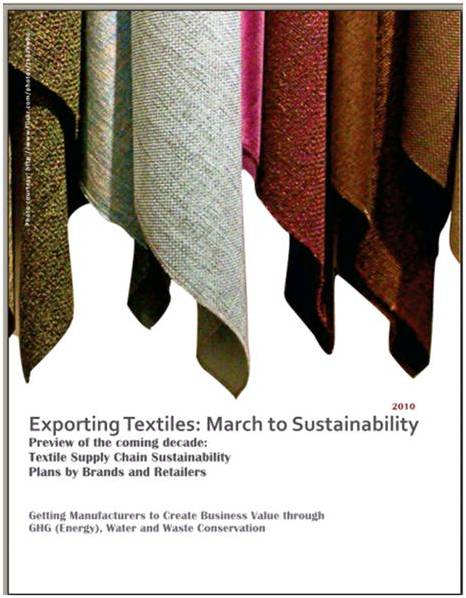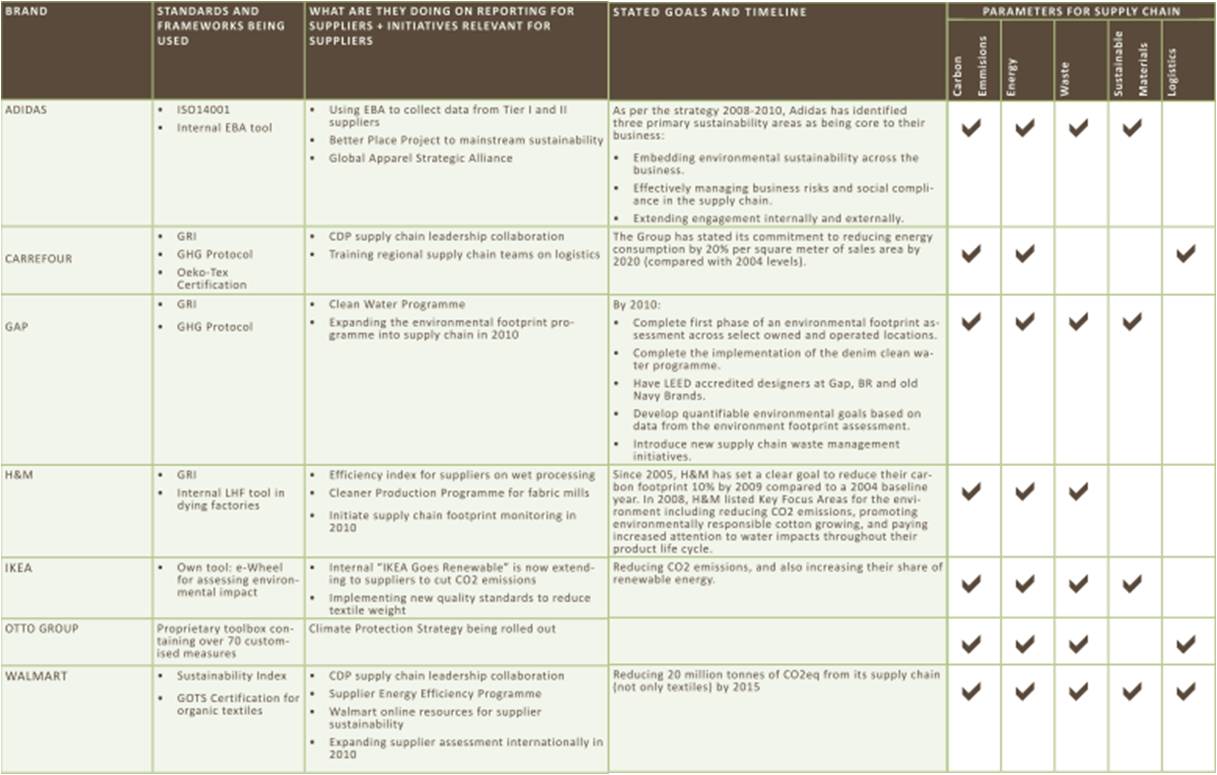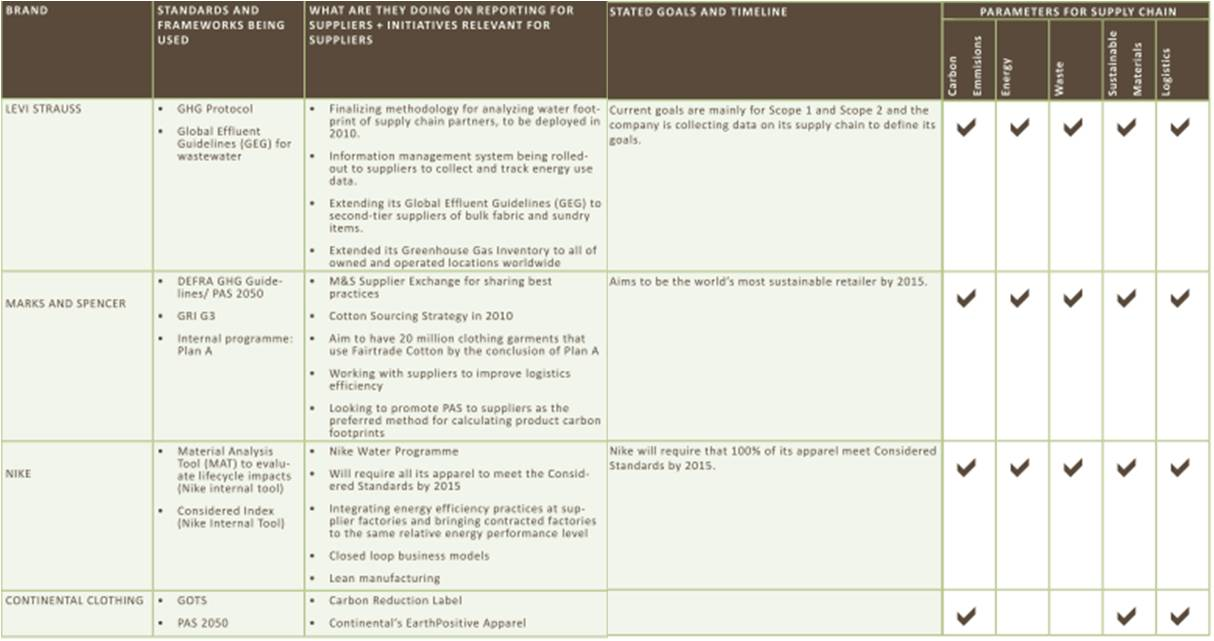A new report from cKinetics, ‘Exporting Textiles: March to Sustainability,’ has mapped sustainability initiatives in the supply chain of global brands such as: Adidas, Gap Inc., H&M, Ikea, Levi Strauss & Co, Marks & Spencer, Nike, Otto, Carrefour, Walmart, Continental Clothing, Phillips-Van Heusen, Timberland Company, Inditex, Primark, John Lewis Partnership, Lindex and Tesco.
Here are some details:
 Progressive brands and retailers have been exploring sustainability initiatives since the middle half of the last decade: testing initiatives first internally and now considering roll-out through their global supply chains. R&D work on sustainability for some of the firms such as Nike and Adidas has been ongoing in their corporate responsibility groups and now is now being integrated into their core business. Similarly leading retailers like Walmart and Marks & Spencer have made this a centerpiece of their new strategy. Several other global players such as PvH and IndiTex are working at integrating sustainability into their EHS initiatives.
Progressive brands and retailers have been exploring sustainability initiatives since the middle half of the last decade: testing initiatives first internally and now considering roll-out through their global supply chains. R&D work on sustainability for some of the firms such as Nike and Adidas has been ongoing in their corporate responsibility groups and now is now being integrated into their core business. Similarly leading retailers like Walmart and Marks & Spencer have made this a centerpiece of their new strategy. Several other global players such as PvH and IndiTex are working at integrating sustainability into their EHS initiatives.
[…]
The report makes the case that the coming decade is going to be about sustainability and optimally using natural resources to generate value in the textile supply chain. The analogy offered is that of quality and the movement towards ISO 9000 in the early 1990s. The investments being made in sustainability allow companies to use fewer resources for greater output. Manufacturers that are early adopters on carbon efficiency, water conservation, energy savings, etc. will not only add to their bottom line but also have an opportunity to differentiate themselves with the buyers in the near term.
This report also touches upon initiatives that companies have already started to engage in to improve raw materials in the supply chain, such as the Better Cotton Initiative and the Organic Exchange. In addition, the report discusses other initiatives where buyers are coming together to form a unified voice, including the Outdoor Industry Association, and working groups assembled by the Business for Social Responsibility (BSR). While much of the current work being done to increase the sustainability of the global textile supply chain is still in its early stages or being applied regionally, in the next 24-36 months these initiatives are expected to significantly influence the mainstream business practices globally.
March to Sustainability 2010 makes some predictions:
1. By the end of 2011 all major textile brands and retailers will have announced initiatives that involve working with a more sustainable supply chain. Most of the firms are already implementing measures within their own facilities and it is a matter of months before they look to their supply chain which is where the majority of the environmental footprint exists. The expectation is that the movement beyond early adopters and into the mainstream will happen between 2012 and 2015.
2. Textile brands will make supplier choices based on which suppliers are able to report and demonstrate sustainability measures.
3. Brands and retailers may struggle initially in mapping out their supply chain but that issue is expected to be overcome by 2011.
4. Some of the low-hanging opportunities from a retailer standpoint will be focused on generating savings on the logistics front through a variety of policy measures on use of transportation alternatives, packaging optimization etc. Several of these measures are expected to gain momentum within 2010 itself.
5. From a supply perspective, vertically integrated firms are likely to be early adopters of sustainability reporting because they have easy visibility throughout their supply chain. They will also likely use this as a market advantage.
6. There will be buzz around carbon non-tariff barriers being raised by some textile exporting nations at the WTO. However the outlook is that market mechanics will soon trump these concerns.
7. The buzz around organic cotton will continue to increase. However there is a growing realization that organic cotton is going to remain a small percentage of the overall raw material for the textile sector and hence the emphasis is expected to build towards other sustainable materials.
(Source: cKinetics)
The full report will set you back USD 150, and is available for purchase here.






